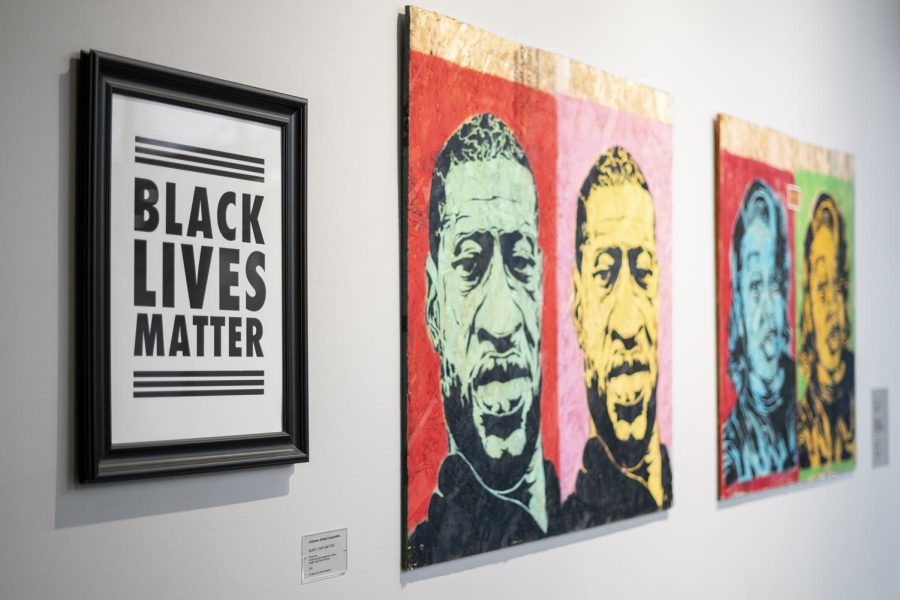A Campus Culture of Activism: Does Seattle U Stand Out?
Say His Name, Remember His Name: George Floyd (Double Portrait) and Say Her Name, Remember Her Name: Breonna Taylor (Double Portrait) by artist David Teichner, hanging in the lobby of the Seattle University Student Center.
With 48,597 degrees awarded in 2020 alone and a workforce of nearly four million, political science is one of the most popular majors for college students in the U.S.. Prospective political science students often seek not only an education, but a politically active campus and engaged student body. Current Seattle University students, faculty and staff reflected on what distinguishes Seattle U’s culture of student activism.
Ziony Franzen, a first-year political science major with aspirations to pursue law after completion of her undergraduate studies, asked this question herself. Franzen is from San Francisco, Calif. and became interested in political science in high school when she noticed the city did not promote civic engagement in the same proportions as other California cities. After that, Franzen began to heavily research civic engagement and accessible voting. She became a senate leader for her high school’s government and sought to inform herself on contentious local issues. Franzen says she chose Seattle U because of the university’s reputation for social activism. She noted that the university stood out among other colleges in advertising its commitment to educating students about issues relevant to the Seattle community.
“I really valued the service learning, the mindfulness and awareness present and also how it’s embraced,” Franzen said. “I saw that there was actual passion about working with communities and the underprivileged.”
Gabi Muna is the treasurer of the Political Science Club and a second-year student studying political science at Seattle U. Being able to access information about the functions of government initially drew her interest to political science.
“It helps to understand the systems that govern our society, that affect everyone in our country, and it can be mystifying for a lot of people,” Muna said. “A big focus on social justice and how the systems in place affect the major oppressed groups historically and to this day.”
Muna also noted that people should be highly educated on political subjects before projecting their claims, as opposed to the uninformed takes which often dominate popular media.
“A lot of times we have arguments that are heavily based on feelings and emotions but we need to find a way to turn that into actual progress, and I believe that political science can make that possible,” Muna said.
While only a fraction of Seattle U students study political science, Seattle U has earned a reputation of widespread campus activism, which has drawn praise from Seattle progressives and the ire of conservatives both in Seattle and across the U.S..
Annarose Jowenson is the Campus Minister for Social Justice at Seattle U. Jowensen argues that social justice activism at Seattle U helps students recognize their ambitions and what they have to offer to their communities, but is a form of care for one’s community.
“Social Justice helps students to recognize their passions, which they can contribute to today’s world,” Jowenson said. “It’s a signifier of how well we take care of each other. We are only taking care of each other when we exhibit care for each other.”
Jason Wirth, the department chair of philosophy, also noted that the university challenges students to be more socially active through the Jesuit tradition of social advocacy. He encouraged students not only to sharpen their critical thinking skills, but to approach topics with an open mind.
“Get educated and get organized! Sharpen your critical faculties and open your heart,” Wirth said.
Wirth also emphasized that the process of social justice and engagement cannot be a solitary one.
“Work with others, build new relationships and develop new allies. Alone we are divided, but together we can begin to reimagine and enact a more just and inclusive world for all sentient beings,” Wirth said.
Though students and faculty joined the Seattle U community for a variety of reasons, many report finding a culture of political activism and attention to social issues on campus. Both in the classroom and throughout the greater city, students look forward to pursuing education and action in law and politics. Whether Seattle U will maintain its reputation for social activism will depend on whether Redhawks continue to engage in campus tradition of political organizing.











